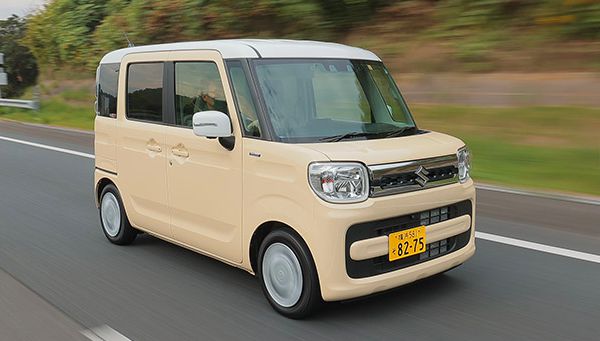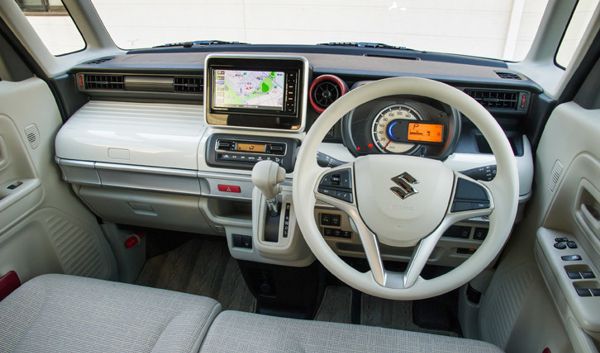Published
on 13
Oct 2021
|
All rights reserved.
|
|
|

|
|
The
tallest Suzuki is also the fastest selling.
|
|
Spacia is
the largest and tallest in Suzuki’s K-cars lineup, also the fastest
selling. It competes with Honda N-Box and Daihatsu Tanto in the
so-called super-tall K-car segment. Standing at nearly 1.8 meters above
ground, it is much taller than it is wide (1.48 meter, as limited by
the regulations), so you won’t expect good roadholding and tight body
control. Moreover, the extra metal and glass means it tips the scale at
about 900kg, a full 100kg more than Wagon R or 250kg heavier than an
Alto. Therefore, when propelled by the 52hp naturally aspirated
3-cylinder motor, performance is marginal, even if you don’t use it for
cross-city driving. It needs turbocharged motor more than any other
Suzuki K-cars.
Unfortunately, turbocharging is only available to the “Custom” body,
which gets a massive chromed grille so ugly that I would rather
skip it here. Admittedly, Daihatsu has a similar questionable taste for
its Tanto Custom. Ditto Honda N-Box Custom. Japanese manufacturers seem
to have a very conservative view of “upmarket” look. They should have a
look to Volvo or Hyundai’s new EV brand Ioniq and learn that minimalist
can be very upmarket. The standard Spacia looks much more interesting –
boxy yet rounded and simple. Upright windscreen and large windows
create a bright and airy ambience. Cartoonish door frames extended into
the roof catch eyes. Horizontal grooves decorate its flat body sides
subtly.

|
|
Dashboard
mimics a suitcase.
|
|
The interior is equally interesting, because the dashboard mimics a
Rimowa suitcase. Open the clamshell suitcase will reveal a storage area
which is fine for placing box tissues, if not large enough for your
iPad. Underneath is a pull-out drawer and pull-out cupholder. The
single gauge instrument is not quite as elegant as that of the latest
Wagon R Smile, but already more stylish than the conventional,
center-mounted gauges on its rivals.
As suggested by its name, the cabin is really spacious, thanks to a
nearly flat floor and 1410mm of cabin height. Small children can stand
straight without touching the roof. With the 50/50-split rear seat slid
all the way backward, legroom is vast to the extent of excessive. You
can fold the rear seat flat in one light action, no matter from the
rear door or tailgate. Placing long luggage like a surf board is a
little more complicated, as you need to detach both headrest and
cushion of the front passenger seat, store the headrest into the cubby
under the seat and place the cushion at foot well, then fold the
seatback forward. Some rivals just need to fold the seatback. While the
Spacia offers twin-sliding rear doors, access to the cabin is not quite
as easy as Daihatsu Tanto, which simply gets rid of the B-pillar. It
also lacks the sliding front seats found on its rivals, so parent
driver will be more difficult to look after the children at the back.
That said, the Spacia’s cabin design is more stylish, and its colors
and textures feel more inviting than the darker and plainer
presentation of Honda and Daihatsu.
|
Verdict:    |
|